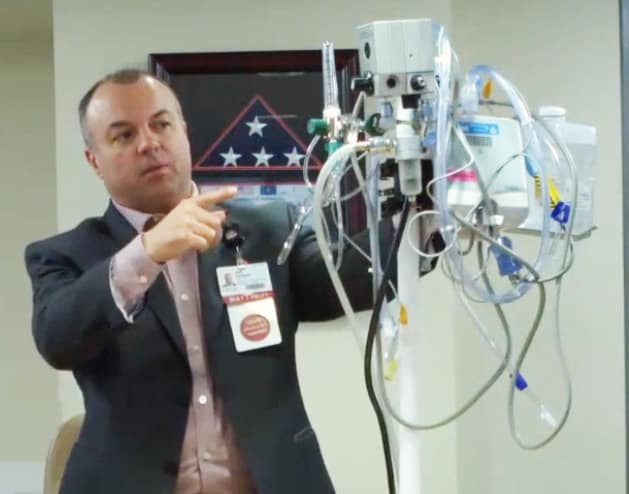Trauma, Stroke Networks Unite to Teach COVID-19 Best Practices, Share Information
| As the COVID-19 global pandemic threatened Arkansas in March, many physicians and nurses in rural hospitals across the state had more questions than answers about the new disease. UAMS went to work to answer them.
The service is dubbed COVID-19 ED2ED All Sites Calls. More than 1,100 of the state’s health care professionals have taken part in the initiative to learn more about COVID-19.
Terry Collins, director of the UAMS Trauma and Acute Care Services, and Renee Joiner, director of the UAMS Institute for Digital Health & Innovation Stroke Program, decided in early spring to do something to meet the demand for information.
Together, they and their teams used the statewide, high-speed data networks of the trauma system and the institute’s stroke program to bring in UAMS subject matter experts to deliver online, live video, roundtable discussion sessions about what was known about COVID-19 and treating patients with it.
Joiner said there just wasn’t that much information on national and state health websites about what to do. Questions were coming in to the institute, and Joiner started doling them out to expert physicians and nurses at UAMS. It was around that time Collins and Joiner began collaborating in a joint response. The first discussion teleconference was on March 23, 12 days after the first presumptive positive case was reported in Arkansas.
“Because of our strong relationships with our stroke hospitals, several of them reached out to us in March to say they’d like some guidance on what to do for COVID-19,” Joiner said. “They wanted to know what UAMS was doing.”
During the live, video discussion sessions, the subject matter experts also began sharing UAMS protocols and best practices and answered questions from participants across the state.
“The people on the other end didn’t have a lot of questions at first because they didn’t know what to ask,” Collins said. “As time has gone on, they have had more specific questions for the subject matter experts as they have learned more from them.”
Those questions helped shape how UAMS responded, and participants shared what they were seeing and experiencing in the different hospitals across the state, adding to what UAMS physicians and nurses knew about what was going on outside of UAMS.
“Seriously, you are providing a critical service at this very unusual time,” Scott Lewis, M.D., wrote in an email in April. “I personally appreciate the information and know the rest of the hospitals do as well. Moreover, it makes us feel less alone. Even before the pandemic, it was easy to feel isolated in a rural area, so your ‘being there’ for us is actually comforting as well because this pandemic is stressful on SO MANY levels.”
Lewis is the Emergency Department medical and trauma director at St. Bernards Five Rivers Medical Center in Pocahontas.
“This would not get off the ground without the people who do patient care at UAMS,” Collins said. “They have so much respect and credibility from working with the seriously ill patients every day. When they give their advice, it is well heeded by the other facilities.”
Since the All Sites Calls first went live, the subject matter experts have conducted 12 online, roundtable discussion sessions. A “Critical Care of COVID-19 Patients” training course, comprised of an additional five sessions, reached 359 more participants and awarded more than 600 hours of continuing medical education credits. Kelly Urban, Ph.D., M.Ed., R.N., taught four of the sessions and a fifth session was taught by Urban and Tammye Whitfield, M.Ed., registered respiratory therapy. (Some participants took part in both the teaching sessions and the training course).
“The format of these meetings has been an informal sharing of information. It’s incredible to be a part of the conversation between our UAMS providers and those providing care across the state,” Joiner said. “There’s a real appreciation of resources available between the two.”
Collins said at first live roundtable discussion sessions were done on a routine business, but as knowledge about COVID-19 and its treatment has grown and spread, they are being done on more of an as-needed basis.
As a trend emerges in a series of questions and emails, a subject matter expert is identified to answer them and a new online, live discussion is scheduled on whatever the topic is, Joiner said.
Every hospital in Arkansas could be overwhelmed at some point by the pandemic. In anticipation of that potential worst-case scenario, patient transfers to larger hospitals like UAMS Medical Center might not be possible, Collins said. That means having health care professionals at Arkansas’ rural hospitals prepared to deliver the best COVID-19 care to patients could be even more imperative.
“I have done a lot of things in my career that I feel have made a positive difference, but not like All Sites Calls,” Joiner said. “This has been amazing, an incredible opportunity, and my team feels like we’ve had some role in this response that was beneficial.”
